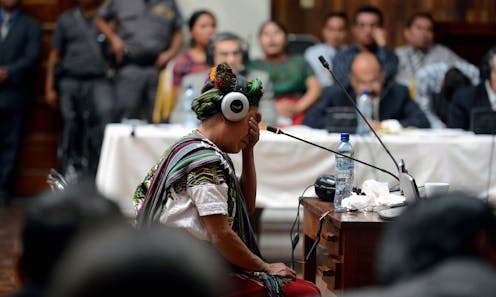This course studies NGOs aiming to help countries recover from mass atrocities and to prevent future violence
- Written by David Campbell, Professor of Public Administration, Binghamton University, State University of New York

Why is this course relevant now?
Systematic identity-based violence is more common than you might think. Mayans in Guatemala[7] were victims of genocide in the 1970s and 1980s, as were Indigenous women in Canada[8] over the past 100 years. Repressive governments in Argentina, Chile and Uruguay[9] assassinated political opponents in the 20th century. Uganda in May 2023 enacted a law that criminalized homosexuality[10], making LGBTQ people fear they too could become victims of identity-based violence[11].
What’s a critical lesson from the course?
Threats of violence against groups due to their identity persist in the United States[12] and globally[13]. Recent political attacks on transgender and other LGBTQ people reflect this threat. NGOs are using their knowledge and skills to stave off the threat of violence against them.
What materials does the course feature?
“PBS NewsHour[14]”: A segment on the trial of former Guatemalan President José Efraín Ríos Montt for genocide, and the role of NGOs in bringing him to trial.
#KIFAYA[15]: A case study of young South Sudanese activists from different ethnic groups who created a music video sung in several local languages to call for an end to interethnic violence and hate speech.
“The Missionary[16]”: A podcast that tells the story of the harm people from wealthy nations can do when they lack the skills and local knowledge to do NGO work outside their home countries. This podcast focuses on a U.S. woman accused of providing medical care in Uganda without any training.
What will the course prepare students to do?
Students ideally acquire a deeper appreciation of the hard work required to address the underlying causes of mass atrocities and identity-based violence. They learn about people who have dedicated their professional lives to reducing the threat of violence – and their successes and failures. I hope it motivates some of them to work in this field, either through volunteering or their professional careers.
References
- ^ Uncommon Courses (theconversation.com)
- ^ teach students about the nongovernmental organizations (doi.org)
- ^ work NGOs do (monitor.civicus.org)
- ^ Community Building Mitrovica (www.cbmitrovica.org)
- ^ District Six Museum (www.districtsix.co.za)
- ^ Rodger Bosch/AFP via Getty Images (www.gettyimages.com)
- ^ Guatemala (theconversation.com)
- ^ Canada (theconversation.com)
- ^ Argentina, Chile and Uruguay (theconversation.com)
- ^ Uganda in May 2023 enacted a law that criminalized homosexuality (theconversation.com)
- ^ LGBTQ people fear they too could become victims of identity-based violence (www.theguardian.com)
- ^ the United States (www.reuters.com)
- ^ globally (www.opendemocracy.net)
- ^ PBS NewsHour (www.youtube.com)
- ^ #KIFAYA (www.maxwell.syr.edu)
- ^ The Missionary (www.iheart.com)
Authors: David Campbell, Professor of Public Administration, Binghamton University, State University of New York

